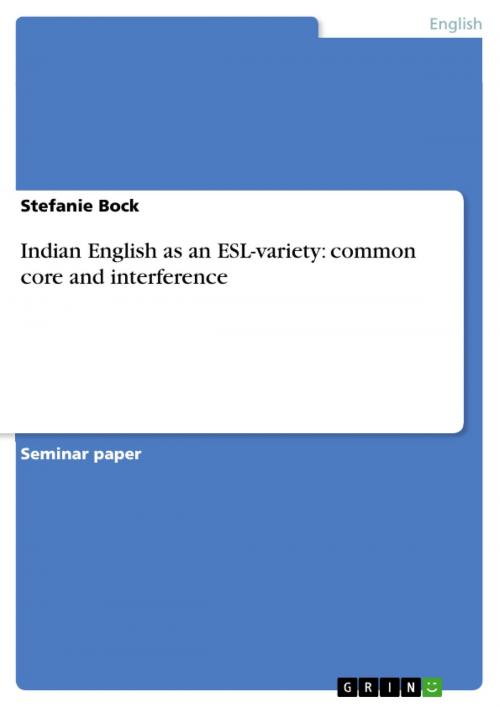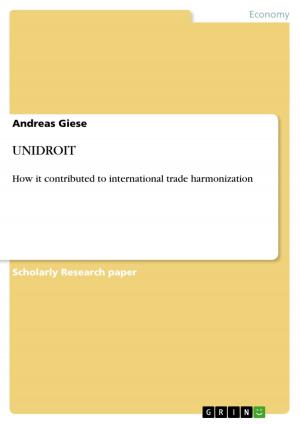Indian English as an ESL-variety: common core and interference
Nonfiction, Entertainment, Drama, Anthologies| Author: | Stefanie Bock | ISBN: | 9783638473927 |
| Publisher: | GRIN Publishing | Publication: | February 26, 2006 |
| Imprint: | GRIN Publishing | Language: | English |
| Author: | Stefanie Bock |
| ISBN: | 9783638473927 |
| Publisher: | GRIN Publishing |
| Publication: | February 26, 2006 |
| Imprint: | GRIN Publishing |
| Language: | English |
Seminar paper from the year 2003 in the subject English Language and Literature Studies - Linguistics, grade: 1, Justus-Liebig-University Giessen, 13 entries in the bibliography, language: English, abstract: Introduction Apparently, the ancient legacy of the building of Babel is finally overcome: the English language has reached a spread all over the world unprecedented in history. People coming from such diverse backgrounds as Europe, America or Africa are now linked by one language: English. When following statistical numbers that estimate the total number of English speakers to exceed 1bn, it is not surprising that English is now agreed to be the lingua franca (cf. McArthur 2001: 1). On the surface, this achievement might be regarded as the fulfilment of a long aspired goal: the dream of universal intelligibility. Yet it brings with it certain conflicts and complications: English, now having reached cultures totally different from those that belong to the up to now accepted standards of English, was thus challenged to become an appropriate means for speakers to communicate within contexts the English language never was used in before. As a result, speakers from countries such as India, Kenya or Nigeria have moulded the English language and have adapted it to their own individual context - a development that might be a hindrance to the vision of English as a 'link language' worldwide. Unfortunately, it is not long ago that many of these New Englishes were considered to be provincial, backward and incorrect (cf. Görlach 1995: 11). Such judgemental views of the issue neither pay attention to the concept of interference the speakers' first language has on English in these countries nor to the deviations motivated by acculturation. In the course of this paper the concepts of interference and acculturation as well as the issue of a universal understandable English are to be investigated in terms of one particular variety: Indian English. The study is structured as follows: Firstly, light will be shed on the different backgrounds an English speaker might come from. In order to introduce into the variety of Indian English as a next step, it will give an overview of how English gained roots in India. In addition to that, some of the most productive processes of adapting the English language to India will be illustrated. Finally, a discussion of some of the most important ideas of an 'International English' intends to touch on the problem of worldwide intelligibility in connection with the many Englishes. For reasons such as the colonial past of India comparisons of Indian English to any standard variety of English will be reduced to the British standard...
Seminar paper from the year 2003 in the subject English Language and Literature Studies - Linguistics, grade: 1, Justus-Liebig-University Giessen, 13 entries in the bibliography, language: English, abstract: Introduction Apparently, the ancient legacy of the building of Babel is finally overcome: the English language has reached a spread all over the world unprecedented in history. People coming from such diverse backgrounds as Europe, America or Africa are now linked by one language: English. When following statistical numbers that estimate the total number of English speakers to exceed 1bn, it is not surprising that English is now agreed to be the lingua franca (cf. McArthur 2001: 1). On the surface, this achievement might be regarded as the fulfilment of a long aspired goal: the dream of universal intelligibility. Yet it brings with it certain conflicts and complications: English, now having reached cultures totally different from those that belong to the up to now accepted standards of English, was thus challenged to become an appropriate means for speakers to communicate within contexts the English language never was used in before. As a result, speakers from countries such as India, Kenya or Nigeria have moulded the English language and have adapted it to their own individual context - a development that might be a hindrance to the vision of English as a 'link language' worldwide. Unfortunately, it is not long ago that many of these New Englishes were considered to be provincial, backward and incorrect (cf. Görlach 1995: 11). Such judgemental views of the issue neither pay attention to the concept of interference the speakers' first language has on English in these countries nor to the deviations motivated by acculturation. In the course of this paper the concepts of interference and acculturation as well as the issue of a universal understandable English are to be investigated in terms of one particular variety: Indian English. The study is structured as follows: Firstly, light will be shed on the different backgrounds an English speaker might come from. In order to introduce into the variety of Indian English as a next step, it will give an overview of how English gained roots in India. In addition to that, some of the most productive processes of adapting the English language to India will be illustrated. Finally, a discussion of some of the most important ideas of an 'International English' intends to touch on the problem of worldwide intelligibility in connection with the many Englishes. For reasons such as the colonial past of India comparisons of Indian English to any standard variety of English will be reduced to the British standard...















